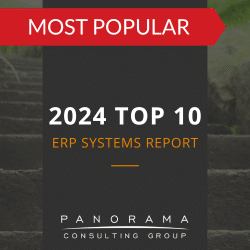“Digital transformation” is more than just a C-suite buzzword. It’s the key to staying competitive in an ever-evolving market.
Today, we’re sharing the top benefits of digital transformation and outlining the specific outcomes you can expect.
What is Digital Transformation?
Digital transformation is a fundamental shift in how an organization engages with customers, employees, and the market. It’s about leveraging digital tools and technologies to reimagine every facet of your business.
If you need a full-scale overhaul, a digital transformation might make more sense than a standalone ERP implementation.
2024 Clash of the Titans
SAP, Oracle, Microsoft, and Infor each have a variety of systems that can support data-driven decision making. We surveyed customers of these four vendors to find out what their selection and implementation process was like.
8 Benefits of Digital Transformation
1. Increased Efficiency and Improved Productivity
For example, a healthcare organization might integrate an electronic health records (EHR) system with robotic process automation (RPA) tools. The EHR acts as a central hub, streamlining information access and reducing manual data entry. Meanwhile, RPA tackles repetitive tasks like appointment scheduling and insurance verification.
2. Greater Agility
A forward-thinking digital transformation strategy can help you quickly adapt to market changes. This is because modern technology enables rapid scaling, faster product development, and improved collaboration.
Imagine using digital twin technology to create replicas of physical objects for real-time testing and improvement. This rapid iteration cycle drives innovation and ensures your product is market-ready when customers want it most.
3. Improved Customer Experience
Implementing modern enterprise software allows you to improve the customer experience.
For instance, many customer relationship management (CRM) systems provide insights that enable you to tailor your products and services.
Some systems even feature AI-powered chatbots that can address billing issues, provide product information, and more.
4. Effective Futureproofing
Digital transformation isn’t a one-time project. By building a culture of innovation, you can leverage data and feedback to identify opportunities for improvement.
Imagine a retail chain using ERP software to analyze omnichannel data. This allows the retailer to pinpoint top-performing product categories in each channel.
In this case, the opportunity for futureproofing lies in inventory allocation. The retailer can make adjustments to ensure popular items are readily available in the right channels.
5. Optimized Supply Chain Management
One of the most sought-after digital transformation benefits is the ability to proactively navigate supply chain disruptions.
Implementing modern digital platforms, such as a supply chain management (SCM) system, enables you to gain this foresight. The key is to implement a system with predictive and prescriptive analytics capabilities.
Think of a global logistics company managing networks of suppliers, factories, and distributors. With a modern SCM system, the company can identify potential disruptions before they impact deliveries. At the same time, the company can identify potential bottlenecks to reroute shipments and adjust production schedules.
6. Enhanced Talent Acquisition
Your digital transformation efforts can help you build a more attractive employer brand.
Cloud-based technology enables you to offer flexible work arrangements, remote collaboration tools, and innovative training programs.
Imagine using human capital management (HCM) software to automate resume screening and identify candidates with specific skill sets. This frees up recruiters to focus on in-depth interviews and building relationships with top talent.
7. Democratized Innovation
Digital transformation can break down silos and empower frontline employees to contribute to continuous improvement. This accelerates the development of innovative products and services.
For example, a manufacturing company might use AR technology to allow technicians to collaborate with engineers on design improvements. This empowers technicians to share insights and contribute directly to product development.
8. Data-Driven Decision Making and Risk Management:
By leveraging advanced analytics, you can gain deeper insights into market trends and operational performance. This empowers you to make informed decisions, mitigate risks, and optimize resource allocation.
Imagine a field service company leveraging IoT sensors and machine learning algorithms to predict equipment failures. This allows the company to schedule maintenance before breakdowns occur.
Forget “Business as Usual”
In today’s hyper-connected world, clinging to outdated business operations isn’t an option. Businesses must look for ways to increase agility and stay competitive.
While the benefits of digital transformation are vast, they’re not easy to achieve. Using ERP consulting services is essential if you want to ensure your project stays on track.
Contact us below for a free ERP consultation.














